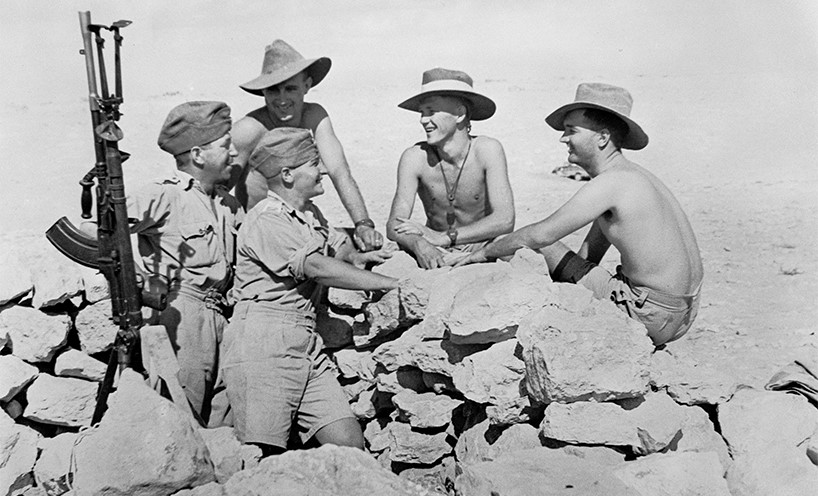
- This event has passed.
The Siege That Forged an Enduring Australian and Polish Friendship: The Rats of Tobruk
November 27, 2021 @ 7:00 pm - 9:00 pm
Event Navigation

At this very special event, hear how the friendships forged in a small, coastal town in northern Africa influenced Australia’s post-war migration and created lifelong bonds across cultures.
The Shrine of Remembrance, in partnership with the Institute of National Remembrance, Poland, presents a digital event on Saturday 27 November honouring the enduring legacy of the Australian and Polish Rats of Tobruk.
Join Dr Mark Johnston, Professor Marek Wierzbicki and Lucyna Artymiuk as they discuss the shared experiences of the Australians and Poles in Tobruk and the impact on Australia’s migration and connection to Poland.
Between April and November 1941, 14,000 Australians were besieged within the Libyan fortress of Tobruk by a powerful Italo-German army. Ordered to deny Tobruk to the enemy for eight weeks, the men held out for five months. Pro-Nazi propagandist and broadcaster Lord Haw Haw (William Joyce) described the defenders as ‘rats’—an insult which they adopted as a badge of honour.
Exhausted, the Australian troops were progressively withdrawn from Tobruk between August and November 1941. Other troops including the Carpathian Brigade, comprising soldiers who had escaped Poland after its conquest by the Nazis and Soviets in 1939, relieved them.
It was the Poles who finally ended the siege when they captured Acroma and linked up with the British 8th Army. In recognition of this feat, the Australians shared with the Poles their most venerated title. Henceforth, the Poles too would be ‘Rats of Tobruk’.
Between 1947 and 1948, Australian veterans of Tobruk helped sponsor the migration of 1,500 Polish soldiers to Australia when it became impossible for these men to return to their homeland, due to Soviet occupation.
This event will be live streamed on the Shrine’s Facebook and YouTube channels.
More on the Speakers:
Lucyna Artymiuk is a second generation Polish Australian, the daughter of a Polish airman who arrived on the third of five transports of Polish Immigrants after the Second World War. She Is currently a history PhD candidate at the University of Melbourne looking for the first time at Polish migrant soldier scheme to Australia in 1947–1948, which was a litmus test for the implementation of mass migration of non-British migrants from the displaced person camps of Western Europe to Australia during the post-war reconstruction era. Lucyna has been a prominent member of the Polish Australian community for the past 30 years and is currently the Acting President of the Polish Museum and Archives in Australia.
Recently she has authored her father’s biography From Poland to Where Ever in the World and in the process uncovered details of the post-war relationship between the Australian and Polish Rats of Tobruk that had not been documented or had been erased from the collective memory of the Polish and Australian veteran communities.
Dr Mark Johnston Mark is one of Australia’s leading authorities on the Second World War. He is the author of more than ten books, including The Magnificent 9th: An Illustrated History Of The 9th Division 1940–46 and An Australian Band of Brothers which concerns Don Company of the2/43rd Battalion. The battalion fought in Tobruk, El Alamein and New Guinea. Mark is the head of History, Politics and Philosophy at Melbourne’s Scotch College.
Professor Marek Wierzbicki is a Polish historian and political scientist, full professor, lecturer at the Catholic University of Lublin (Faculty of Social Sciences); since 2007, chief specialist (senior researcher) at the Institute of National Remembrance. His research interests include, inter alia, relations between the authorities and society in communist Poland, ethnic relations under the Soviet occupation of Poland and Eastern Europe(1939–1941), the history of Polish political emigration after 1945 including wartime- military and civilian – exiles, the social history of the 20th–21st centuries and the role and mentality of youth in both Eastern (communist) and Western (capitalist) Europe during the Cold War (1947–1991). One of his scholarly works is a biography of Zygmunt Szadkowski – one on the Polish Rats of Tobruk who became one of the leaders of the Polish political emigration after the Second World War.
Media Enquiries:
Interviews with the speakers available upon request
For more information
Anna Lensky
Pitch Projects
0425 766 780




 239 A'Beckett Street Melbourne, Victoria, 3000
239 A'Beckett Street Melbourne, Victoria, 3000  03 9326 9288
03 9326 9288  office@historyvictoria.org.au
office@historyvictoria.org.au  Office & Library: Weekdays 9am-5pm
Office & Library: Weekdays 9am-5pm

